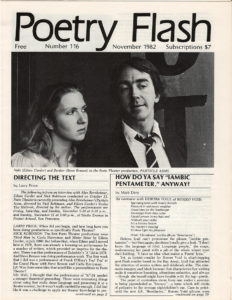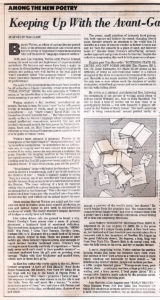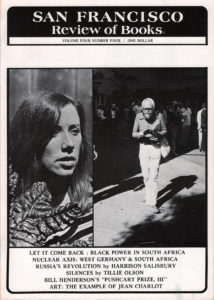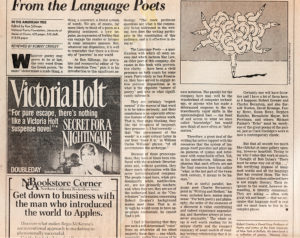Continuing my work in the archives, I want to locate the shift from a more or less happy recognition of new writing in the late 70s to what can only be called full-fledged reaction by the mid 80s. While the encounter with Duncan over a materialist reading of Zukofsky was a premonition, it was an isolated—if internalized—event. The San Francisco literary avant-gardes—Language writing among others—got a lot good press at their moment of emergence, in a climate of openness that only encouraged their work. The milieu of Left cultural activism—backed up by federal support for alternative publishing through the NEA and community arts jobs via CETA—is readable in the October 1978 cover of the San Francisco Review of Books. The author shot of Kathleen Fraser juxtaposed with Ron Silliman reading Ketjak at Powell and Market Streets goes with the Left agenda: articles on Black power, the nuclear arms race, the Russian revolution, and—the small press. As with the earlier countercultural moment in the 50s/60s, avant-garde writing and small press publishing were seen as part of a cultural politics extending out in all directions. The inky, unpretentious typography of the cover goes along with a baseline populism of multiple agendas.
This is not to say that Language writers were not provocative or intensely focused on their project within a group consensus. Kent Johnson, in a letter commenting on the run-up to the 80s Poetry Wars, however, misjudges the degree of antagonism in the period (overestimating it as a kind of “back formation,” perhaps):
Surely the Language formation of the time was far from some set-upon, aggrieved party, an innocent grouping besieged by the attacks of irrational others? Anyone even a bit familiar with the history (including in Poetry Flash!) will find the suggestion humorous, given that your tendency was early-on and melodramatically engaged in a radical position-taking endeavor, very consciously deploying aggressive tactics of (yes) poetry war, as multiple other historical avant-garde factions had before you. You were all very stubborn and smart and calculating and sometimes vicious. And you extended the war, crucially, into academic circles, not least in the establishment of a strategic beachhead at Buffalo, which proved centripetal, in regards the balance of forces vis-a-vis the NAP predecessors you were intent on displacing for not being “materialist” enough. (Letter to BW, 6 April 2020, by permission)
 While such a position predicts the reception to come, it rises to the level of projection as a historical account. Steve Benson, also commenting on the Zukofsky event, sees a plurality of possibility and a refusal of binary exclusions—not so much a break with the past as a turn:
While such a position predicts the reception to come, it rises to the level of projection as a historical account. Steve Benson, also commenting on the Zukofsky event, sees a plurality of possibility and a refusal of binary exclusions—not so much a break with the past as a turn:
I don’t remember your forcing a break with the New Americans, if such a power to force breakage inheres in anyone. I personally don’t recognize having experienced a break but, as you’ve thoughtfully called it, a turn. None of us appreciated Whalen or Creeley or O’Hara any less in the years after that talk than before it, so far as I know. The pity is that Duncan and some of his adherents continued to embrace an either/or orientation toward the progression (across time if not toward improved productions) rather than a both/and orientation that would make so much more sense to me. (Letter to BW, 9 April 2020, by permission)
The November 1982 cover of Poetry Flash—in an issue that juxtaposed Poets Theater with Debora Iyall of Romeo Void—maintains this openness and plurality. Eileen Corder and Nick Robinson’s improvisatory directing of plays by Language writers meets the spontaneous performance style of Steve Benson. Benson’s avant-garde project was, in fact, to contest simple binaries, and to develop a style of self-presentation on that refusal. This ambivalent openness, it is true, took place alongside more pointed moments of challenge (as in Benson’s staging of Views of Communist China at Bob Perelman’s loft, which I maybe disrupted)—but the variability and openness of response is the point. That openness was picked up on, and responded to, by two gay New Narrative writers and critics: Steve Abbott and Dennis Cooper. Abbott, who died in 1992 of complications of AIDS, published numerous short reviews of Language writing, an important part of the history of New Narrative (see his recent collection of essays, Beautiful Aliens). Cooper, as well, wrote intuitive appreciations of writing that was anything but the kind of straight-up queer prose he is known for. In a subsequent post, I hope to look at precisely what these two were saying.
My question is the nature of the reaction that began to set in the early 80s. Bruce Boone, a third gay critic of the period, published a significant push-back to Language writing in Steve Abbott’s journal Soup (“Language Writing: The Pluses and Minuses of the New Formalism”). This essay, coming out of a contested dialogue with Silliman in a Marxist study group, but influenced by early contact with Fredric Jameson, then at UC Santa Cruz, chose as its example Bob Perelman’s poem “China,” which Jameson’s postmodernism essay would famously misread. From the mythopoeic direction, on the other hand, a different kind of antagonism surfaced that saw the politics of the signifier to be no politics at all, a complete abandonment of meaning. Where Blake had written “Opposition is true Friendship,” this reading saw Language writing as the epitome of the fallen world of Los. An early example of this position is an essay by Kenneth Warren on “Language and Its Meaning” [t/k], and it continues to this day. In some sense, Marxist and the Blakean readings align, leading to a discussion of allegory I must bracket here.
The true cause of the reaction was, I argue, recognition—in the old sense, of “making it” in public. The stakes of the movement had accelerated; events and publications were happening nearly every week; the output was ferocious. I will not rehearse the bibliography here, but by the mid 80s, and with the combined appearance of Total Syntax, The L=A=N=G=U=A=G=E Book, and Writing/Talks, it was massive—making its way into university presses and potentially the mainstream. This potential breakthrough was contested in a series of reviews published in the San Francisco Chronicle, starting with a 1983 review titled “The Subject Is Language” by Tom Clark (on Gloria Frym and Stephen Rodefer), which reads in part:
In the pool hall of contemporary poetry, a style I like to call the nouveau abstraction currently rules the table. [. . .] It’s a poetic movement that voluntarily carries a heavy dragweight of opacity, making “non linear” word structures its point and largely such time-honored ingredients as drama, tension, narrative, beginning, middle, end. [. . .] Saying your subject is language is the same thing as saying you really don’t have any subject but want to say something nonetheless. You are, in the old expression, talking to hear yourself talk. (19 October 1983)

 This was a new scene of engagement, but I did not think Frym and Rodefer were the best examples. To my later chagrin, I wrote to Clark saying so: that would get me the attention I deserved. After the eventful year 1984, which saw the publication of Total Syntax by a university press, I got my comeback in a omnibus review in the Chronicle literary review that led with a vicious take-down of my book. I was being disciplined for my pretensions to theory—seen as a form of challenge behavior that I was only partly guilty of; more likely my guilt was for reality testing and the skepticism that entails. I was made a public spectacle of verbal whipping, which looks back, it is true, on my earlier pretentiousness in materially critiquing the “master poet”:
This was a new scene of engagement, but I did not think Frym and Rodefer were the best examples. To my later chagrin, I wrote to Clark saying so: that would get me the attention I deserved. After the eventful year 1984, which saw the publication of Total Syntax by a university press, I got my comeback in a omnibus review in the Chronicle literary review that led with a vicious take-down of my book. I was being disciplined for my pretensions to theory—seen as a form of challenge behavior that I was only partly guilty of; more likely my guilt was for reality testing and the skepticism that entails. I was made a public spectacle of verbal whipping, which looks back, it is true, on my earlier pretentiousness in materially critiquing the “master poet”:
“Total Syntax” brims with logical jawbreakers (“Olson’s work is always a breakthrough, and if not it still maintains the rhetoric of one”—which is logically similar to saying “Mary is a woman, and if not, acts like one”) and passages of stylistic densepacking reminiscent of bad translations from the Russian: “The inner ordering of a texts, its variation within what is possible in a given language, can account for its propagation in that language.” This is the kind of mumbo jumbo you’d hear from a guy who stumbled into a linguistics lecture one day, and walked out an instant expert the next.
It was not simply the caricature of Language writing that was heavy-handed; note also the anxious opening to questions about proper gender assignments. But it is the refusal to read any specific argument in my book that delivered the blow, combined with more generous, but merely descriptive, readings of fellow poets—some of my closest associates such as Robert Grenier and Lyn Hejinian. Theory is what got me abjected from the community of fellow writers—a violent casting out from the aesthetic. Therein lies a politics of exclusion as a tactic of contestation: an attempt to remove Language writing from the community, as the test case or maintenance of what counts as community in the first place. (Letters to the editors were written; scandals devolved; more bitter positions were taken; the community was divided; people stopped talking; documentation follows.)
In the 90s, Jacques Rancière theorized the politics of the aesthetic as what he termed the “distribution of the sensible,” what sensory presentations or acts of speech are incorporated in, or excluded from, community. The struggle over Language writing was a struggle over what is included and excluded, but it is mediated as well by a central figure, the “master poet” who organizes what counts as community under the form of a “rule” (such that “everyone would agree” that such and such is a legitimate work of art). After a series of attacks, ripostes, and letters to the editor published largely in Poetry Flash but starting to bleed out into the mainstream literary world, Clark hardened his position with an article titled “Stalin as Linguist” (July 1985), picking up my poetic reference to the 1930s Marr Controversy (where Stalin criticized a linguist for claiming that language had a class basis), as somehow disclosing a covert authoritarianism in my work. What was going on here was nothing less than an Alt Right attack on liberal polity, abjecting the intellectual or theorist or poet or professor or avant-garde as a threat that must be excluded.
In defense of aesthetic community, but also to assert its “rule-governed” order, Robert Creeley weighed in with support of Language writing, in a genial and open-handed review of Ron Silliman’s anthology In the American Tree (“From the Language Poets,” September 1986). Creeley’s review is not so much a reading of the works themselves as a defense of their legitimacy:
Whatever poetry may prove to be at last, the very word (from the Greek poeiein, “to make”) determines a made thing, a construct, a literal system of words. We are, of course, far more likely to think of a poem as a pleasing sentiment, a lyric impulse, expression of feeling that can engage the reader or listener in some intensive manner. But, whatever our disposition, it is well to remember that there is a diversity of “poetries” in our world.
Creeley moves quickly from the judgment of taste (challenging the lyric as the sole mode of aesthetic pleasure) to a politics in which “a diversity” of poetries is achievable. Language writers, simply in their difference from the norms of taste, are making such diversity possible—rather than a monoculture of the great works and their cultural entailments. The difference from canons of taste thus redefines “community,” turning Language writing’s challenge to the canon into its inclusion in it.
The brilliance of the writers collected here is not simply literary. Their response to the world, however demanding, is intently communal. They are asking—often with great wit and heart—that we recognize that language itself is real and we must learn to live in its complex places.
As in the best of Creeley’s critical writing, much is condensed here. Language writing is “not simply literary”; in being “demanding,” it is “communal”—how does that work? Because, “with great wit and heart”—i.e., with sincerity as virtue—they open the polity so that we may live in “complex places.” This is the “redistribution of the sensible” that Rancière theorized. For Creeley, the nonnatural, unconventional, “machine made of words” Clark saw as nothing more than a gimmick are precisely a way of reentering a condition of sociality that is not based on prior exclusions. This was too much for Clark; shortly he would publish a rebuttal in the Chronicle (“Another Look at ‘The Tree'”) and then return to the language-baiting argument of “Stalin as Linguist” in The Partisan Review (June 1986)—which I will take up in the next post.
Notes and links
Bibliography:
Boone, Bruce. “Language Writing: The Pluses & Minuses of the New Formalism.” Soup (ed. Steve Abbott) 2: 2–9.
Creeley, Robert. “From the Language Poets.” Review of In the American Tree, ed. Ron Silliman. San Francisco Chronicle (28 September 1986): 8.
Clark, Tom. “Another Look at ‘The Tree.” Review of In the American Tree, ed. Silliman. San Francisco Chronicle (12 October 1986): 14–15.
———. “Keeping Up with the Avant-Garde.” Review of Total Syntax and other works. San Francisco Chronicle (13 January 1985). Letters to the editor by David Melnick, George Lakoff, and Stephen Schwartz.
———. “Stalin as Linguist.” Poetry Flash (July 1985): 5, 11.
———. “Stalin as Linguist.” Partisan Review (June 1987): 299–304.
———. “The Subject Is Language.” Review of Back to Forth by Gloria Frym and Four Lectures by Stephen Rodefer. San Francisco Chronicle (19 October 1983).
Jameson, Fredric. “Postmodernism; or, The Cultural Logic of Late Capitalism.” New Left Review 146 (July–August 1984): 53–92.Links:
Archive 01: Zukofsky @ SFAI.
Archive 02: Reception Study.














